
George Glenn Jones was an American country musician, singer, and songwriter. He achieved international fame for a long list of hit records, and is well known for his distinctive voice and phrasing. For the last two decades of his life, Jones was frequently referred to as "the greatest living country singer", "The Rolls-Royce of Country Music", and had more than 160 chart singles to his name from 1955 until his death in 2013.

Gold Star Records is an American independent record label, which was founded in 1941.
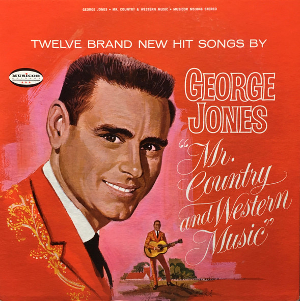
Mr. Country & Western Music is an album by American country music artist George Jones released in 1965 on the Musicor Records label.

I Wish Tonight Would Never End is an album by American country music artist George Jones. It was released in 1963 on the United Artists record label.

George Jones Salutes Hank Williams is the 1960 country music studio album released in May 1960 by George Jones. The album was the ninth studio LP release, and was recorded in one session. The album has been reissued multiple times since its release, including the tracks being reused on many compilations.
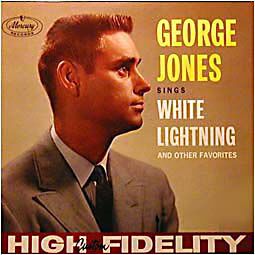
White Lightning and Other Favorites is a studio album released by George Jones on May 26, 1959. Its title track "White Lightning" was a #1 Country hit in 1959.

Country Church Time is the sixth studio album released by George Jones on January 20, 1959. The LP includes multiple early gospel recordings by Jones on Starday.
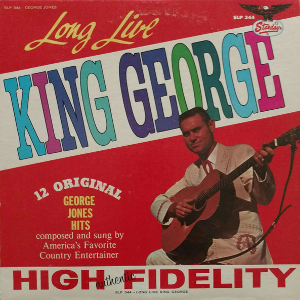
Long Live King George is a 1965 country music album released by George Jones. The album was long thought to be a studio release; however, it is a late Starday Records compilation of Jones recordings throughout the mid- to late 1950s.

Grand Ole Opry's New Star is the debut studio album released by George Jones in November 1956 with Starday Records. Produced by Jones' manager Pappy Daily, the album was recorded during early sessions in 1954, throughout 1955, and other sessions in 1956. It is also the first album to be released on the Starday label, a label only four years old.

The albums discography of American country artist, George Jones contains 80 studio albums, 132 compilation albums, three live albums, ten video albums and seven box sets. Of his studio albums, 69 are solo releases while 11 are collaborative releases. In 1956, Jones's debut studio LP was issued on Starday Records titled, Grand Ole Opry's New Star. The label only issued one studio effort, but would release a series of compilation. On Mercury Records, Jones released six studio LP's including Country Church Time (1959) and George Jones Salutes Hank Williams (1960). He switched to the United Artists label in 1962, where he released 13 studio LP's. Among these was a collaborative LP with Melba Montgomery called What's in Our Hearts (1963), which was his first to chart the Billboard Top Country Albums survey. He moved to Musicor in 1965. Among the label's studio LP's was I'm a People (1966), which reached the top of the Billboard country survey. Musicor also issued his first collaborative studio album with Gene Pitney, which made the Billboard country LP's chart and the Billboard 200.

"Why Baby Why" is a country music song co-written and originally recorded by George Jones. Released in late 1955 on Starday Records and produced by Starday co-founder and Jones' manager Pappy Daily, it peaked at 4 on the Billboard country charts that year. It was Jones' first chart single, following several unsuccessful singles released during the prior year on Starday. "Why Baby Why", has gone on to become a country standard, having been covered by many artists.
"White Lightning" is a song written by the rockabilly artist J. P. Richardson, best known by his stage name, the Big Bopper. The song was recorded by American country music artist George Jones and released as a single in February 1959. On April 13, 1959, Jones' version was the first number-one single of his career. The song has since been covered by numerous artists. Richardson never got to see the success of the record, as he had been killed in an airplane accident 6 days before its release.
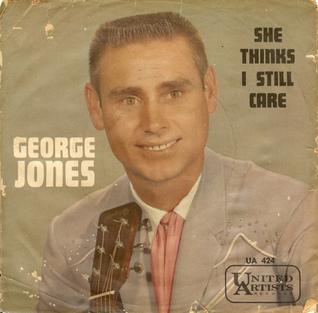
"She Thinks I Still Care" is a country song written by Dickey Lee and Steve Duffy. First popularized by George Jones, the song has been recorded by multiple artists, including Connie Francis, Anne Murray, Elvis Presley and Patty Loveless.
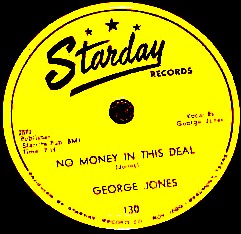
"No Money in This Deal" is the debut single by country musician George Jones, released on February 18, 1954 on Starday Records.

"Play It Cool, Man" is a song by George Jones. It was released as his second single on May 29, 1954 on Starday Records. It is the oldest recording to be included on his debut album in 1956.
"Seasons of My Heart" is a song written by George Jones and Darrell Edwards. The song was released as the b-side to the #4 hit "Why Baby Why" in 1955. The song was also recorded by Johnny Cash and, released in 1960, it became a #10 hit.
"What Am I Worth" is a 1956 country music song released by George Jones, co-written by Jones and Darrell Edwards. The song was released on January 14, 1956 and was one of the fourteen songs included on Jones' debut album with Starday Records in 1957.
"You Gotta Be My Baby" is a song written and recorded by George Jones. It was his second Top 10 hit on Starday Records, peaking at #7 on the country singles chart. That same year, he sang "You Gotta Be My baby" at his first appearance on The Grand Ole Opry. According to Bob Allen's book George Jones: The Life and Times of a Honky Tonk Legend, Jones nearly walked off the Opry show when one of the WSM officials told him he could not take his guitar with him onstage but relented after Opry regular George Morgan handed him a guitar owned by Little Jimmy Dickens and promised he would take responsibility. In the video biography Same Ole Me, George recalled, "I was just so nervous. This was the biggest thing that could ever happen to anybody in the world and I was just shakin'. I mean just truly shakin' all over."
"You're in My Heart" is a song written and recorded by country music artist George Jones. It appeared as the B-side to his first single on Starday Records, "No Money in This Deal."
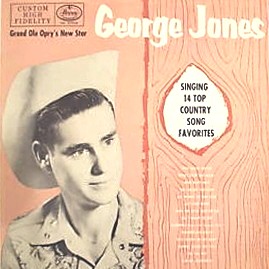
George Jones Sings is a compilation album released by George Jones in May 1957. The album didn't chart well; however, it plays many of his best early recordings.













